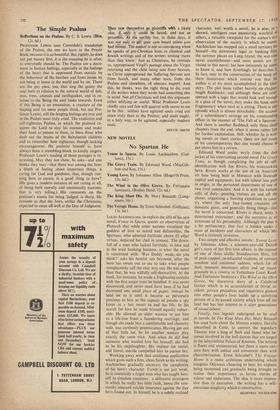NEW NOVELS
No Spartan He
The Voyage Home. By Ernst Schnabel. (Gollancz, 13s. 6d.) Louis AUCHINCLOSS, to explain the title of his new novel, Venus in Sparta, quotes an observation of Plutarch that while other nations visualised the goddess of love as naked and defenceless, the Spartans, who admired fortitude above all other virtues, depicted her clad in armour. The down- fall of a man who lacked fortitude, in love and in the trust banking business, is what the novel is concerned with. 'Was Daddy weak, do you think?' asks his hateful son Seymour, after the hero has swum out to sea to take what people complacently call the easy way out. He was more than that, he was wilfully self-destructive. At the bank, for instance, he made a frightening mistake with the first major trust he handled. It was never discovered, and never need have been if he had destroyed one small piece of paper; instead he held on to it until it became as perversely precious to him as the capsule of poison a spy keeps as a last resort to end his life. In his search for love he made himself equally vulner- able. He allowed an older woman to use him as a life-line from a foundering marriage; and though she made him a comfortable and chummy wife, was carelessly promiscuous. Having got out of that little lot, he let another woman play exactly the same trick. And when he did find someone who wanted him for himself, she had to be his stepdaughter. His instinct for social, and literal, suicide compelled him to pursue her.
Working away with that assiduous application which gives such a firm, clean finish to his writing, Auchincloss gradually uncovers the complexity of his hero's character. Farish is not just weak, he is essentially a frigid man who has taught him- self to simulate emotions : a defensive stratagem in which he really has little faith, hence the con- stantly renewed suicide insurance against the day he is found out. In himself he is a subtly realised
character, well worth a novel; he is also, as a shrewd, intelligent man excessively watchful of others, a valuable viewpoint for the author's nice observation of the society in which he moves.
- Auchincloss has mapped out a small territory for himself—the downtown legal or banking firm. the summer places on Long Island, the war-time naval establishment—and most points are re- visited in this novel; but how intimately he seem' to know it, and how divertingly he-describes It In fact, only in the construction of the book tire there limitations which remind you that the author is at his most accomplished in the short story. The plot leans rather heavily on chapter- length flashbacks; and although these are inter- spersed with a logic that would look well enough in a plan of the novel, they make the book seem fragmentary when read at a sitting. There is one episode which is almost detachable : the account of a subordinate's revenge on his commandinS, officer in the manner of 'The Fall of a Sparrow. And there is another flashback only three short chapters from the end, when it seems rather late for further explanation. Still, whether he is writ' ing novels or short stories, there are not many of his contemporaries that one would choose to put above him in a review.
Edmund Ward smiles wryly from the dust jacket of his entertaining second novel The Gray) Train, as though completing the job of self• identification with Joe Rivers, his wisecracking hero. Rivers works at the site of an American air base being built in Morocco with Stateside capital and equipment, but with labour less purl in origin, in the personnel department of one 01 two rival contractors. And it is with his variom calls of duty—pouring visitors on and off the planes, organising a hunting expedition in coun• try where the only four-footed creatures are domestic goats, and generally fixing things—t ha the novel is concerned. Rivers is sharp, witty, determined entertainer; and the narrative is ar extension of his personality. Although the plot t! a bit perfunctory, that fact is hidden under mass of incidents and characters of which Mr Ward is tirelessly inventive.
Two simple and effective novels : Young Love by Johannes Allen; a nineteen-year-old Danist girl's story of her first love affairs, in the manner of one of those idyllic Scandinavian films, ful of peak-capped, co-educated students, of summer sunshine and autumnal sadness, which for al their innocent intentions often end up mean gruously in a cinema in Tottenham Court Road And Fortunato Seminara's The Wind in the Oliva Grove, the discursive diary of a Calabriar farmer which in its accumulation of trivial in cident, private prejudices and inquisitive glance! into other people's lives builds up a satisfying picture of a by-passed society which lives oil' tht land but has lost interest in it after generation! of casual labour.
Finally, two legends redesigned to be read as novels. In The King Must Die, Mary Renault has used facts about the Minoan empire, literally unearthed in Crete, to convert the legendary Theseus into a king of flesh and blood who be• comes involved in the bull-dances that are staged in the labyrinthine Palace of Knossos. The writing is fluent and unmannered, but there is more con• cern here with colour and movement than with characterisation. Ernst Schr_abel's The Voyage Home is a more ambitious undertaking which imagines Odysseus chancing to hear his exploit being recounted and gradually being brought tc realise their importance as heroic stories of valour and endurance. The idea is more impres. sive than its execution: the writing has a self• conscious simplicity which is unattractive.
GEOFFREY NICI4OLSOIN


































 Previous page
Previous page